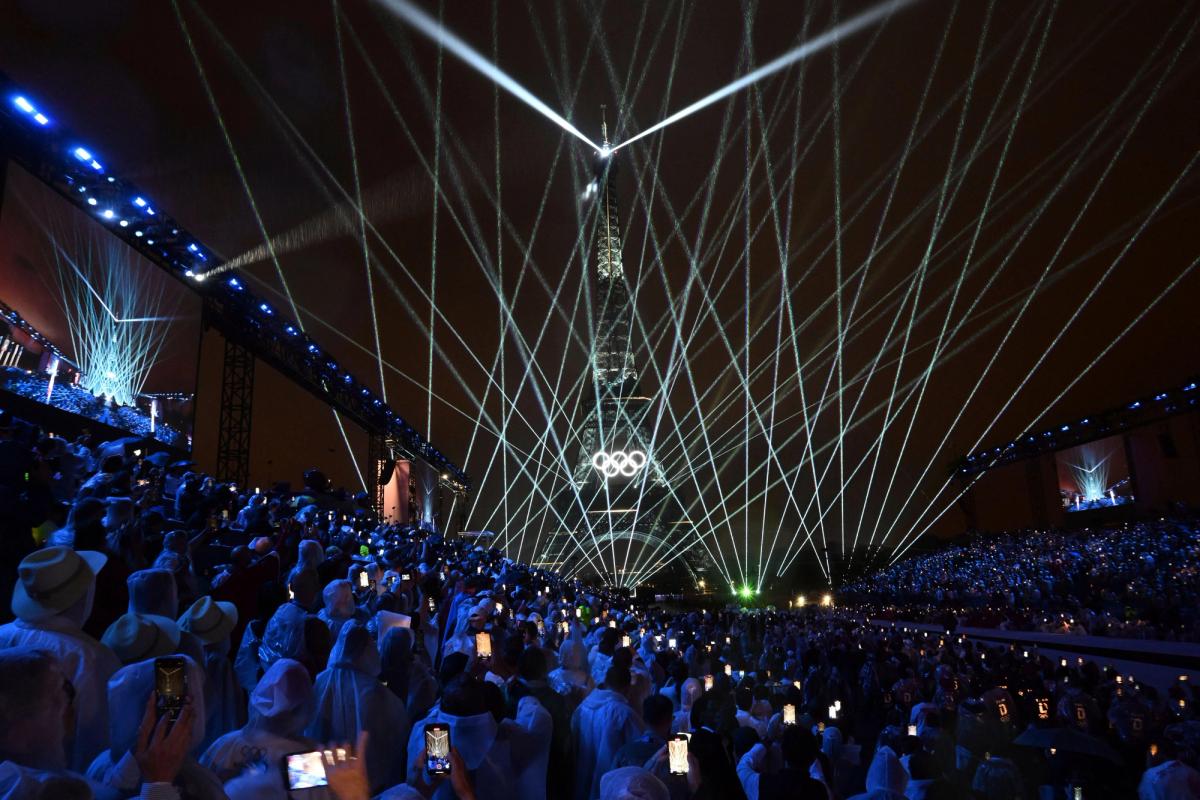All of a sudden, during Friday’s opening ceremony for the Olympic Games, Gabrielle d’Estrées left her bathtub, braving the rain, to dive into the Seine. She was quickly joined by other several characters who had sprung to life from paintings in the Louvre. In the confusion, a Minion stole the Mona Lisa. Acrobats and singers danced their way across the roofs of the Musée d'Orsay and the Louvre. The dazzling ceremony, staged for the first time in a city centre rather than a stadium, was largely inspired by the art, culture and the history of Paris.
All the monuments gracing the banks of the Seine—a Unesco World Heritage site—starred in the show. They range from the national library to the Eiffel Tower; the cathedral of Notre Dame, being rebuilt from the devastating 2019 fire; and the Grand Palais, which is still undergoing a massive renovation. The four-hour extravaganza ended with a powerful performance of Edith Piaf's “Hymn to Love” by Céline Dion, and the Olympic flame—formed not of fire but a spray of coloured mist—lighting the night skies from a balloon raised over the place de la Concorde. The image recalled the first manned, untethered flight, by the Montgolfier brothers in Versailles in 1783.
From start to finish, the ceremony highlighted cultural diversity and promoted inclusion—recognising womens' contributions to French history, for example and calling for world peace. Yet it did so against the backdrop of a fractured nation, where more than ten million citizens recently voted for the xenophobic National Rally (RN) party in the parliamentary elections. It was an event that could be read in two ways: as an expression of hope, or denial.
Reactions to the event were unsurprisingly mixed. Generally, the world's press hailed the show as “unique” and “unforgettable”. The Economist suggested that France could “change how cities host the Olympics for good”. However, a spokesperson for RN denounced it as a “shameful spectacle, ransacking French culture”. This sentiment was supported by the Hungarian prime minister Viktor Orban and the Italian vice premier Matteo Salvini.
The French conservative daily Le Figaro did not appreciate the “woke parade”, which it claimed included "divisive provocations”, such as scenes of a beheaded Queen Marie Antoinette singing a revolutionary song from her prison. (The monarch, overthrown during the French revolution, was shown singing “The aristocrats, we’ll hang them“.)
The Bishops’ Conference of France said it “deeply regretted the inclusion of scenes of derision and mockery of Christianity”, interpreting one sketch of drag queen revellers at a bacchanalian feast as a mockery of the Christ’s Last Supper. This led Anne Descamps, a spokesperson for Paris 2024, to release a statement defending the vision of artistic director Thomas Jolly, which ”really did try to celebrate community tolerance.” However, she added, “if people have taken any offence, we are, of course, really, really sorry.”
There were other issues feeding into tensions surrounding the day. On Thursday, acts of sabotage had halted trains across the country, including those carrying athletes, spectators and high-profile guests, such as the British prime minister Keir Starmer, to the event. A standout performance by singer Aya Nakamura was made especially poignant in light of her being subjected, earlier this year, to racist claims that she was not entitled to represent France in the ceremony because she was born in Mali. (The abuse she received had led to a criminal investigation being opened in March.) In May, meanwhile, the Memorial of the Shoah in Paris, the city's Holocaust memorial, was defaced—with police investigating whether the action was ordered by the Russian security services.
Such realities, and the ceremony's location, meant that the opening took place in what felt like a city under siege, surrounded by a security contingent of more than 50,000 soldiers, policemen and gendarmes, the heaviest military deployment seen in the capital since the Second World War.
A week before the opening of the games, all bridges were closed and streets along the Seine were blocked by heavily guarded barricades; no one was allowed through, including cyclists, pedestrians, buses and taxis.
Cafés, restaurants, small shops had to close, museums were inaccessible. Residents left town and tourists did not dare to come; hotel reservations went down to 50-55%. Frank Delvau, the chair of the Paris Hotel Industry union, called the situation “catastrophic”.
Air France, the nation’s flag carrier, meanwhile, expects a deficit of more than €180m from June to August because of the games.
The French president Emmanuel Macron welcomed the success of his “crazy idea” to deliver the parade. But the extravagant event—described by Le Monde as staged on “an island” in “splendid isolation”—will undoubtedly fuel growing debate over the impact and enormous cost of the games, and the wisdom of staging such a mega event in the heart of a city.


